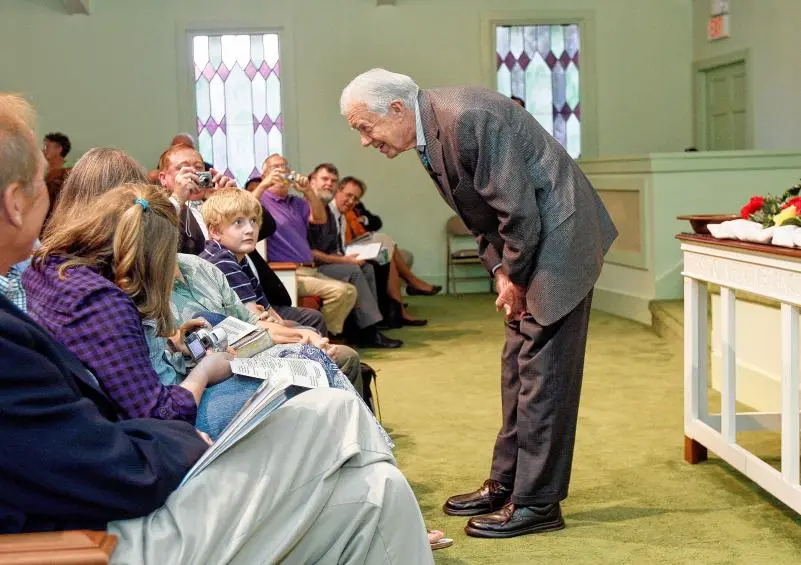23. THE TROUBLED 1970s

CHRISTIAN LEADERSHIP IN THE WHITE HOUSE
CONTENTS
 Nixon Nixon
 Ford Ford
 Carter Carter
The textual material on this webpage is drawn directly from my work
America – The Covenant Nation © 2021, Volume Two, pages 263-270.
|
Where did America's political leaders, as
defenders of the long-standing Christian social order, take their stand
in America's unrelenting move toward Boomer Secular-Humanism – and
"democracy by judicial decree"?
Nixon had been raised in a Quaker home,
second of five boys, in a very Quaker community (Whittier, California).
Nixon's mother was the product of two centuries of Quaker heritage.
However, his Methodist father became a Quaker only in marrying Nixon's
mother, and when Nixon was thirteen, he and his father went forward
together at a local revival to commit themselves to Christ. In high
school Nixon proved himself to be an excellent student and was awarded
his senior year the prestigious Harvard Club prize. But disappointment
accompanied all his hard-earned successes. He lost a hard-fought
election for the position as student body president, was never popular
with the girls, and his family could not pay the balance of the cost of
a Harvard education.1 So instead he headed off to the local Whittier College.
In his senior year in college, his
Christian faith was deeply shaken by his brother's death, and by
extensive exploration of the traditions and claims of his Christian
faith. Although he would continue to identify himself as a Christian,
and observe rather normal Christian practices, his actual spiritual
life from then on would always remain a very private matter.
Receiving a generous scholarship, Nixon headed off to Duke Law School, again doing very well, graduating summa cum laude in
1937. But with the Depression in full swing, jobs were just not to be
found (a Harvard degree would have helped, which Nixon sadly was always
aware of) and he returned to his hometown to practice law there. Here
he met and two years later (1940) married a local school teacher, Pat
Ryan.
In early 1942, in response to America's
entry into World War Two, the Nixons moved to Washington for him to
take up a position in the bureaucracy, a job which Nixon ended up
hating. He soon gained entry into the U.S. Navy as a lieutenant junior
grade and in mid-1943 was moved closer to the action in the South
Pacific. Here he rose quickly in rank as an administrative officer and
would serve until the beginning of 1946. However, he would remain in
the Naval Reserves all the way up until he retired at the rank of
commander in 1966.
At the beginning of 1946 Nixon was called
back to California by the local Republican Party, to take up the
electoral campaign for Congress against the Democratic incumbent Jerry
Voorhis. Questioning Voorhis's intelligence and political sympathies
(suggesting that they were Communist in nature) he soundly defeated his
opponent that November.
In Washington, Nixon was active in his
support of the Marshall Plan, and also the investigation into the
extent of Communist infiltration into American politics, especially at
its highest levels. In 1948 he took the lead in pushing forward the
House Un-American Activities Committee (HUAC) investigation into the
activities of Alger Hiss. This would begin the problems Nixon would
have henceforth with the members of America's intellectual community,
who were fully convinced of Hiss's innocence, and angry over what they
considered to be Nixon's unwarranted obsession with a "Red Threat"
endangering America. Of course, time would prove that Nixon was
entirely correct in the Hiss matter. And indeed, Nixon was onto the
dangers of the rising Cold War long before many other Americans
understood the challenges and dangers involved in this new form of
ideological battle.
Motivating Nixon was certainly some form
of continuing influence of his Quaker upbringing. Nixon's no-nonsense
approach to moral matters formed the very heart of his personal view of
life, making him both certain and inflexible in his approach to his
public, political life. But there was also another side to his
character, certainly also of Quaker origin, in that he spent much time
in the Bible, and in quiet prayer, which he himself stated was to
listen to God – not tell God what to do. In this he was much like his
Quaker mother: very strict when it came to ideas of moral performance,
but very private when it came to matters of personal faith.
Nixon knew the Bible well, but did not
include Biblical references in his public addresses as president. And
although he frequently referenced God, he seldom spoke of Jesus.
Yet he was well-aware of America's Christian history, and in his 1972
Thanksgiving Address underlined the fact that Puritan founder John
Winthrop was most correct in identifying America as God's "city set
upon a hill," that it was important to follow the Puritan heritage in
being "the light of the world," and that it had always been America's
call by God, and source of the country's greatness, to provide
spiritual leadership to that world. He also stated that every American
president had found cause to turn to God, ultimately leaving office
with a very deep religious faith.
As president, Nixon often held worship
services in the White House, with a variety of pastors of all faiths
(Protestant, Catholic, Jewish) leading the various services. It served
several purposes: cutting down the uproar of press, protesters and just
the curious that accompanied his Sunday attendance at local churches;
setting some kind of religious tone to life in the White House; and, of
course, helping his political image among his many Christian supporters
nationwide.2
Perhaps even more significant in defining
the religious character of the Nixon presidency was the close
relationship Nixon cultivated with the "power of positive thinking"
pastor Norman Vincent Peale of New York City's Marble Collegiate
Church, but even more importantly the evangelist Billy Graham, with
whom Nixon developed a close friendship, perhaps the closest of all.
They met, discussed, prayed together constantly. But ultimately that
friendship would have to pay a huge price for the scandal that
ultimately broke Nixon, indeed, broke many of the Nixon circle:
Watergate.
Because ultimately what will always bring
Americans to measure Nixon as a Christian was Watergate, from Nixon's
vulgar language and commentaries on America's various social groups, to
ultimately his effort to cover up the whole mess of the break-in.
It is a bit reminiscent of the Biblical
King David, Israel's most beloved king, who was caught by the prophet
Nathan trying to cover up his affair with Bathsheba, and the depth David
was willing to go (having her loyal husband killed in battle) in the
affair, in order to also cover up the birth of the child that developed
out of this misadventure. Both Nixon's and David's crises pointed to a
problem that has never been resolved by man – how so easily tremendous
power in the hands of a fully sovereign ruler can come to destroy the
integrity of that same individual. David repented; Nixon resigned. Both
lived on after that. But the favor they had once enjoyed (Nixon's 60
percent vote in 1972, for instance) would be forever ruined after that.
Worse, Nixon is still today not really remembered for all the ways he
served his country extremely well as president. It seems instead that
he will always be remembered by generations to come as Nixon, the evil
president.
1They
needed that money to pay for the health care of Nixon's ailing
older-brother Harold, who died of tuberculosis in 1933 (as had a
younger brother Arthur in 1925) – leaving Nixon deeply shattered over
his brothers' deaths.
2In 1973 the atheist Madalyn Murray O'Hair tried to get a federal court to shut down these White House services.
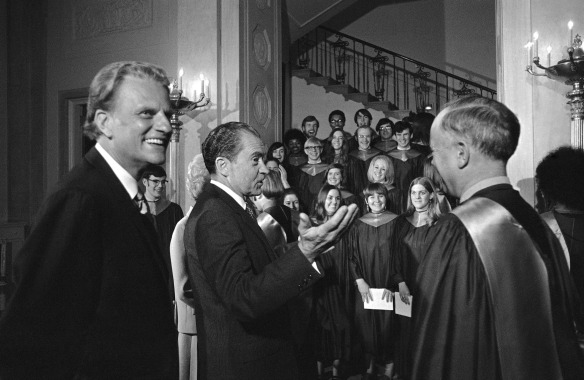
Nixon, following a worship service at the White House conducted by Billy Graham – March 15, 1970
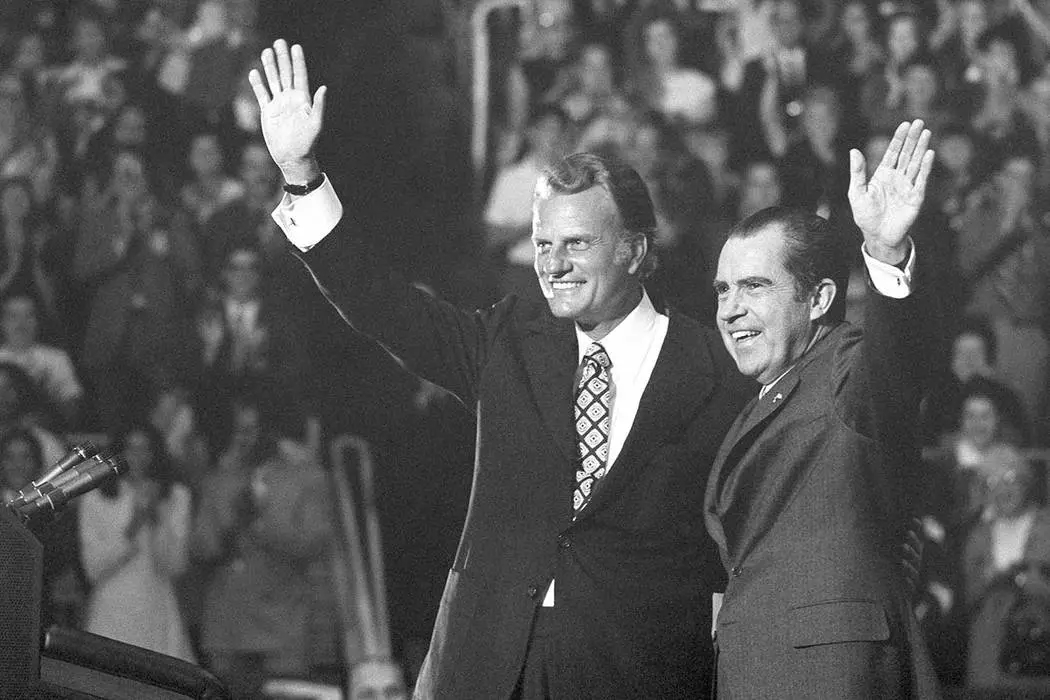
Nixon and Graham in Charlotte, North Carolina – 1971
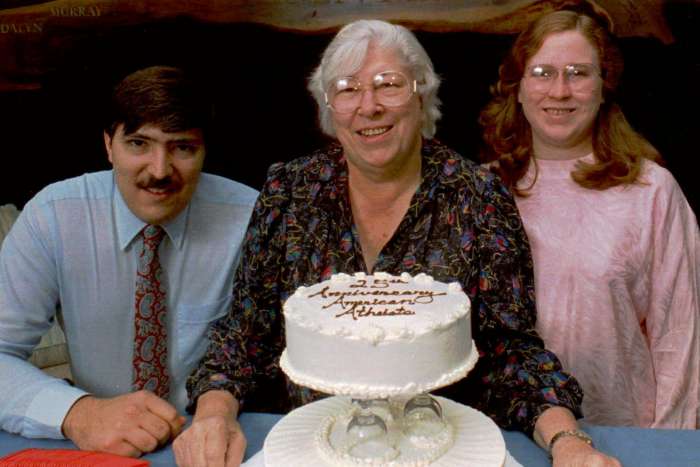
Famous atheist and strongly pro-Communist Idealist, Madalyn Murray O'Hair,
with son Jon and granddaughter Robin - June 1988
Besides
constantly bringing lawsuits to court to block Christian practice in
public, Madalyn had been strongly opposed to Nixon's Christian White
House.
Oddly enough, another son, William (below), would eventually become a
very well-known Christian ... and chairman of the Religious Freedom
Coalition |
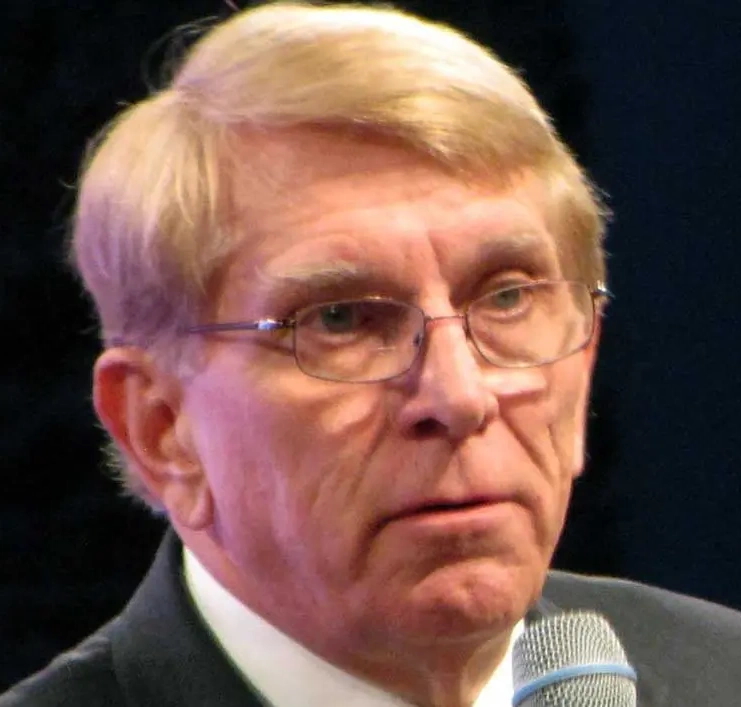
|
The individual left with the responsibility of
getting America past this huge mess was indeed a profoundly deep
Christian. He was of course an all-around good guy, able to pull off
one of the greatest feats in American political history which is to get
both his Democrat and Republican colleagues in Congress to like and
respect him deeply.
In his college days he proved to be an
outstanding athlete, whom professional football teams wanted badly to
recruit upon graduation. But Ford chose to go to Yale Law School
instead. And thus his career headed in a political rather than an
athletic direction. He served in the Navy during World War Two, first
as a physical trainer, then aboard an aircraft carrier in the Pacific,
where he experienced the horror of sea battles with the Japanese. After
the war he returned to Grand Rapids to take up law practice. And in
1948 he ran for the local House seat in Congress, and was easily
elected. In fact, he would be easily re-elected to that same House seat
thereafter – all the way up to his Vice-Presidential appointment in
1973.
Spending most of his time in Washington,
he and his wife Betty were very active in the Episcopal Immanuel
Church-on-the-Hill in Alexandria (Virginia), and Ford was a regular
participant with fellow congressmen in a weekly prayer breakfast they
held together.
But the real measure of Ford as a
Christian was how he handled the most important responsibility of his
presidency, dropped into his lap immediately upon taking that
responsibility in August of 1974: getting the nation past this horrible
social-moral trauma of Watergate. The Democrats were prepared to pursue
this matter for however long it took to destroy Nixon, and probably
much of the country's remaining moral nerve along with it. After a
month of constant prayer over the matter, Ford did the one thing that
the nation needed most: forgiveness, so that the nation could move
ahead in its existence. He knew well that this would cost him his standing
with many of his old Congressional friends. He knew that if he had any
thought to continue national service as president, he was undercutting
that possibility, probably irreparably. But a month into his office as
president, after Sunday morning worship, he returned to the White House
to announce to the world that he was issuing a comprehensive
presidential pardon for Nixon. The Democrats, and even many Republicans
were outraged. They wanted revenge for Nixon's acts of injustice, not
pardon.
But for the well-being of the country
this was absolutely the right decision. And he was able to make this
decision because he was a Christian, not a Secular "peace and social
justice" warrior.
Forgiveness always comes at a huge price,
one that human pride finds very difficult to muster. The human ego
instinctively prefers revenge – and has well-developed means by which
to rationalize or justify that burning desire. That's why we hire
lawyers: to achieve "justice." But forgiveness is the most important of
all Christian virtues, powerful in the way it restores broken life
(which "justice" seldom achieves).
God forgave man by placing his son on
that cruel Roman cross, and Jesus uttered those words of that same
forgiveness even as he was dying. Christians – not social justice
warriors – are supposed to understand the totally irrational value of
forgiveness, even when it comes (as it always does) at a huge price.
But it is a price that ultimately saves, saves big, much bigger than
"social justice" (raw revenge).3
And that was Ford the Christian, acting
in a totally Christ-like manner, in order to save his nation from its
self-destructive quest for "justice." It cost Ford dearly, to save
America from itself. But he did, and America moved forward, amazingly
quickly afterwards.
It had to have inspired Graham and others
who had put so much trust in Nixon, and felt so deeply betrayed by
Watergate. But ultimately Graham and some others moved on, even rebuilt
a relationship with the disgraced former president, and Nixon himself
moved on, actually to serve as wise counsel to future presidents and
political officials. The social justice warriors, of course, never
forgave Nixon, and were able to write that unforgiveness into their
history books, even elementary and high school textbooks, ones that
would remember Nixon only as that evil president.
But didn't the social justice warriors
forgive Ted Kennedy for Chappaquiddick? No, not really.
They just simply put it out of their minds and thus avoided having to
pay some kind of personal price in the matter. It was simply as
if the event never actually happened. That's not
forgiveness. That's politics.
3Thus
it was that unlike the British and French who took revenge on Germany
after World War One – and soon paid a heavy price in the form of Nazi
revenge paid back to Britain and France – Truman was quick to forgive
Germany and Japan after World war Two ... and bring them into close
friendship with America.
Ford announces his presidential pardon of Nixon – September 8, 1974.
|

|
Carter grew up in a family of non-conformists
living in an out-of-the-way small town of Plains in Southwestern
Georgia. All of his family went off in different directions, Jimmy
Carter taking the road of a regular church-attending born-again-Baptist
(much like his father, though not his rather independent-minded and
socially quite "Liberal" mother). Carter's dream growing up was to
attend the U.S. Naval Academy in Annapolis. But he had to take a more
normal post-high school route of attending Georgia state colleges for
two years before finally being admitted to the Academy. Here
(1943-1946) he spent the war-years training to become a naval officer.
He did quite well academically, also continuing to maintain his deep
Christian convictions and loyalties. And he did so as well during his
years serving as a nuclear engineer in the world o f the submarine. But
when his father died in 1953, he left the navy to take over part of
(and soon rebuild) the family farm, where back in Plains he became,
like his father, a very active member of the local Baptist church. Here
he also followed his mother's path in resisting the enormous pressures
placed on him to fall in line with the segregationist mindset of the
local community.
In 1962 he turned to politics, defeating
an opponent in a very dirty race waged against Carter for a seat in the
Georgia state Senate. Here he proved to be a very hard-working
legislator (actually a compulsion to stay on top of every detail in
every matter possible, which would always haunt his managerial style).
He also tended to be very critical of the flaws or imperfections of his
political colleagues – which tended to make him something of a
political loner in the state capital. But he got things done.
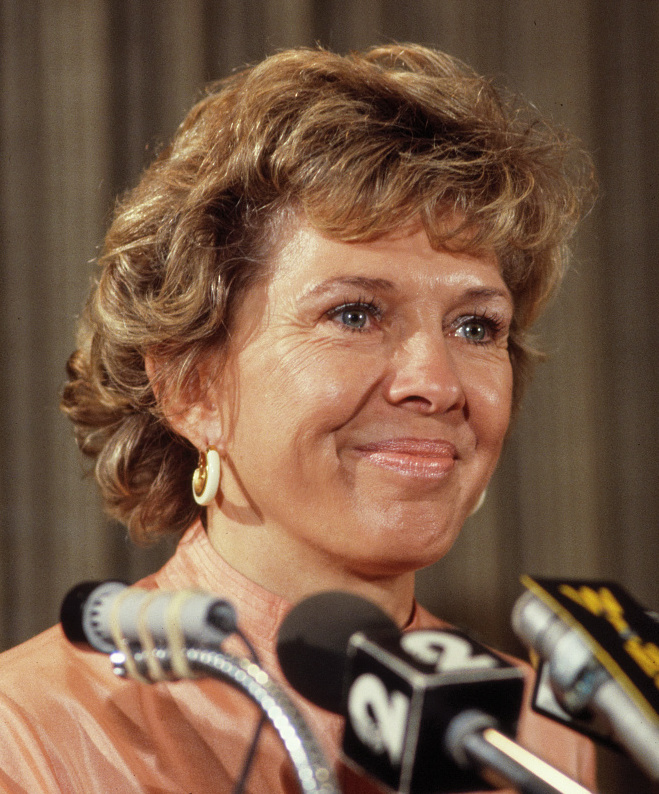
But when he then chose to run for the position of Georgia governor in 1966,4
he did not even qualify for the Democratic Party runoff, and ultimately
the spot went to the arch-segregationist Lester Maddox. This defeat
threw Carter into something of a personal crisis. But with the help of
his evangelist sister, Ruth Carter Stapleton, and some time in prayer, Bible study, and reflection, he underwent
something of yet another born-again experience. This ultimately led him
to take time off to do door-to-door evangelistic work in the North
(Pennsylvania and Massachusetts), most notably in impoverished Hispanic
communities.
But in 1970 he returned to Georgia, again
running for the Democratic Party candidacy as governor (hiding his
Liberal attitudes away from public view) and this time gaining the
Democratic Party nomination and thus also the governor's office at the
capital in Atlanta. During the campaign he never answered the Liberal
attacks of the Atlanta media, which by doing so gave off the impression
that he was indeed the segregationist they accused him of being, which
actually helped build his vote in rural Georgia! But as governor
(1971-1975) he was quick to reveal himself to be not the White
segregationist as many had been led to believe.5
His big push as governor was in the area
of massive bureaucratic restructuring, extensive educational
programming for the poor, racial integration, and environmental
protection, issues not that different from the ones going on in
Washington at the time. Meanwhile, since Georgia governors were limited
to a single term, Carter realized early on that he needed to look more
broadly at his options if he were to remain in the business of
politics. His attempts to bring notice to his name in the 1972
Democratic National Convention got him nowhere. But in 1973 he was able
to get David Rockefeller to make him a part of Rockefeller's
prestigious Trilateral Commission (set up that year to promote
international cooperation among Japan, Western Europe and North
America) – finally bringing some degree of national notice to Carter.
Also, Robert Strauss, chairman of the Democratic National Committee,
asked Carter if he would head up the party's Congressional Campaign
Committee, to help Democratic Party candidates in the 1974
Congressional midterm elections. This would put Carter in close
relationship with national politicians. And thus when the 1976
elections swung into view, Carter was in a position to gain an early
lead in the Iowa caucus and New Hampshire primary. Suddenly the Carter
name was on everybody's lips. Who was this inspiring new face out of
Georgia?
In the campaign, much attention was paid
to Carter's frequent acknowledgement of his "born-again" relationship
with God in Jesus Christ, something that many of the more secular press
and even the old staid denominations knew little about at that point.
But like Kennedy in 1960, Carter was very careful to distinguish
between his personal faith and his approach to the civic duties of the
U.S. presidency. Mostly, America came to understand what it was that
Carter was trying to clarify in his very Baptist idea of the absolute
separation of church and state. Strength in one area did not mean
weakness in the other. They were just two different worlds.
Well maybe. Certainly Carter made it
clear that Scripture gave no prescriptions on handling environmental
problems, health care programs, national educational policy, etc. Those
were matters of state, not religion, although certainly informed by a
Christian sense of charity for the poor and weak, and the key
understanding of the basic equality of all (and thus equal importance
of all) in the nation. And indeed Carter had been very strong on this
matter as Georgia governor.
In November, 1976, he was elected
president and certainly tried to honor his Christian precepts while
serving in that office. But, as already noted, high principles and
complex realities were not easily blended. When he tried to pursue high
principles, things messed up quickly on the political playing fields.
But he was a fast learner, and ultimately found that high principle is
best served by a strong understanding of the reality of human nature
and behavior (thus Political Realism) – which Christianity itself has
no particular argument with or opposition to (unlike Humanism!).
As president, Carter was actually less
likely than his predecessors to make public demonstration of his
personal faith, sensitive to the possibility of being accused of
forgetting his promise to keep church and state separate during his
presidency. Even Billy Graham was almost never seen around the White
House, although a big part of this was a result of some harsh words
exchanged during the Carter-Ford contest, when Graham proved rather
clearly to be a Ford supporter. 6
Nonetheless, prayers, Bible study and
Christian spiritual reflection were a strong part of the Carter
presidency, all the way to the end of his four-year presidency. And if
nothing else, this certainly helped introduce the nation to the idea of
the more evangelical, born-again side of the Christian faith (which was
also being pushed forward by the growing charismatic movement of the
1970s and after).
4He
could have so easily won the position as Congressman that year if he
had run for the House seat rather than the governorship. But a
Congressional seat would have probably ended the possibilities of his
finding the way to the White House as he ultimately did.
5The
seemingly gentle Carter could get very tough – even cynical – as a
campaigner … and then once in office return to being the high-minded
individual that he was capable of being.
6They would, however, over the coming years develop a quite close relationship.
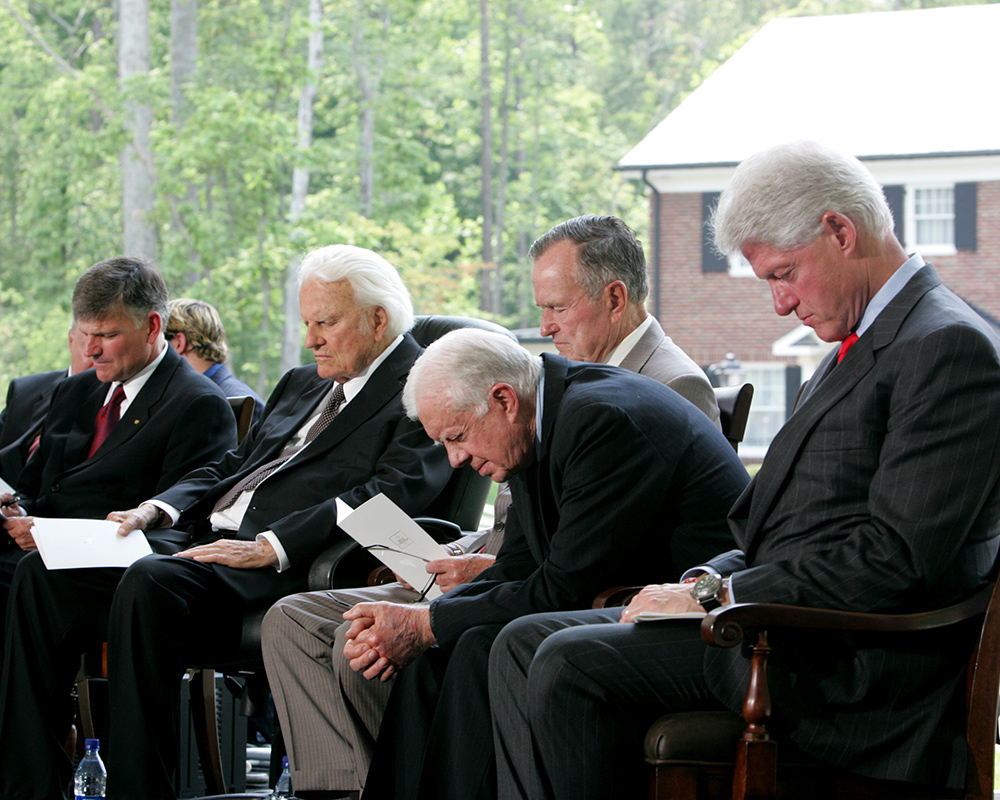
Presidents Carter, Bush, Sr. and Clinton with Billy Graham
praying at the dedication of the Billy Graham Library – May 2007
Carter delivers a Sunday School lesson at the Baptist Church
in his hometown of Plains, Georgia – August 23, 2015

Go on to the next section: Reagan – Strong Replaces Nice
 Miles
H. Hodges Miles
H. Hodges
| | |


 Nixon
Nixon









